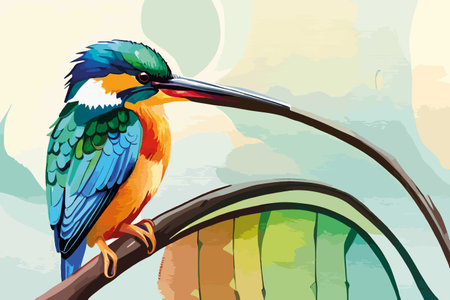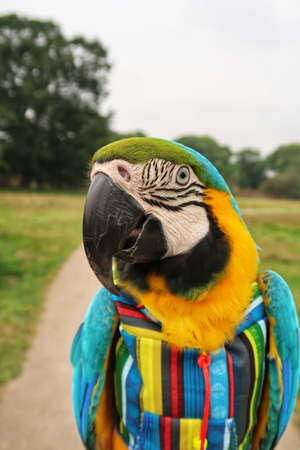1. Introduction: Quaker Parrots and Their Unique Appeal
Quaker Parrots, also known as Monk Parakeets, have rapidly gained popularity among pet lovers throughout the United Kingdom. Renowned for their vibrant green plumage and lively personalities, these charming birds are much more than just a splash of colour in British homes. UK bird enthusiasts are particularly drawn to Quaker Parrots for their remarkable intelligence, playful antics, and impressive mimicry skills. As British culture continues to embrace a deeper appreciation for animal companionship, the appeal of Quaker Parrots stands out due to their affectionate nature and adaptability to various home environments. Whether perched in a cosy London flat or enjoying the gardens of the countryside, Quaker Parrots are capturing the hearts of Britons with their unique blend of wit, sociability, and characterful charm.
2. British Attitudes Towards Exotic Pets
The British have long been renowned for their love of animals, with pets holding a special place in many households. However, the attitude towards keeping exotic pets, such as Quaker Parrots, has evolved significantly over the years. Historically, exotic animals were seen as status symbols among the aristocracy and wealthy classes, often displayed in private menageries or imported for curiosity and prestige. Today, British society views the ownership of exotic species through a lens of responsibility and welfare, reflecting broader cultural values around animal care.
Historical Perspective
In the Victorian era, collecting rare birds and animals was a fashionable hobby, but little attention was given to the specific needs or wellbeing of these creatures. Over time, growing awareness of animal sentience led to legislative changes and improved standards for pet ownership.
Current Perspectives on Exotic Pet Ownership
Modern Britain is characterised by an emphasis on responsible pet ownership and animal welfare. The keeping of exotic pets like Quaker Parrots is now regulated under laws such as the Animal Welfare Act 2006 and the Dangerous Wild Animals Act 1976. These regulations aim to ensure that all pets receive appropriate care, habitat, and enrichment suited to their natural behaviours.
Key Considerations for Exotic Pet Owners
| Aspect | Expectations & Responsibilities |
|---|---|
| Legal Requirements | Compliance with licensing and welfare legislation |
| Animal Welfare | Provision of suitable diet, housing, socialisation, and veterinary care |
| Environmental Impact | Preventing escapes and protecting native wildlife |
| Ethical Sourcing | Ensuring pets are captive-bred rather than wild-caught |
Cultural Values: Compassion and Education
The British public often supports animal charities and educational initiatives that promote the humane treatment of all creatures. There is a strong cultural expectation that pet owners will research their chosen species thoroughly before making a commitment, especially when it comes to exotics like Quaker Parrots. This aligns with the national ethos of compassion and respect for living beings.
Summary
Overall, while the fascination with unusual pets persists in some quarters, contemporary British attitudes stress ethical considerations, legal compliance, and above all, the welfare of the animals involved. Keeping a Quaker Parrot as a pet is therefore not just about personal enjoyment but about embracing a tradition of responsible stewardship within British society.

3. Legal Considerations and Regulations in the UK
When it comes to keeping pet Quaker Parrots in Britain, it is crucial to understand the legal landscape, as regulations can vary across the country. The Department for Environment, Food & Rural Affairs (DEFRA) provides overarching guidance and enforces legislation that pet owners must adhere to. Quaker Parrots, also known as Monk Parakeets, have attracted particular scrutiny due to their reputation as an invasive species in certain regions.
Ownership Restrictions and Permits
Unlike some other countries where Quaker Parrots are outright banned, in most parts of the UK, private ownership is permitted provided you comply with animal welfare standards. However, local councils may enforce additional restrictions depending on environmental concerns or previous issues with feral populations. It’s advisable to check with your local authority before acquiring a Quaker Parrot, especially if you live near protected wildlife areas or city parks.
Import and Movement Regulations
Importing Quaker Parrots into the UK is subject to strict controls. DEFRA requires that all imported birds come from approved countries and are accompanied by valid health certificates. Quarantine procedures may also apply to prevent the spread of avian diseases. If you’re moving within the UK, Scotland and Wales may have specific requirements differing slightly from those in England, so always consult regional government advice before relocating your feathered friend.
Breeding and Sale Guidelines
Breeding Quaker Parrots is legal but regulated under the Animal Welfare Act 2006 and other relevant animal trade laws. Breeders must ensure proper facilities and care standards are met. Selling Quaker Parrots—whether through pet shops or online platforms—must be done responsibly, ensuring birds are sourced legally and are healthy. Some areas may require breeders and sellers to hold specific licenses or register with local authorities.
DEFRA Guidance and Regional Differences
DEFRA regularly updates its advice regarding exotic pets like Quaker Parrots, particularly if new ecological impacts arise. For instance, there are heightened monitoring efforts around London, where small feral colonies have been reported. In contrast, rural regions might have fewer restrictions but will still expect compliance with national animal welfare laws. Always refer to both DEFRA’s official website and your local council for the most current information.
In summary, while keeping a Quaker Parrot is generally allowed in Britain, responsible ownership means staying informed about evolving legal requirements. By respecting these guidelines, you not only protect native wildlife but also contribute positively to Britain’s unique approach to pet culture.
4. Ensuring Proper Care: Nutrition, Housing, and Enrichment
For those embracing the joys of Quaker Parrot ownership in Britain, ensuring your feathered companion thrives requires thoughtful attention to diet, accommodation, and daily stimulation. The UK’s unique climate and lifestyle bring specific considerations when caring for these vibrant birds at home.
Nutrition: A British Perspective
Providing a balanced diet is essential for your Quaker Parrot’s well-being. While specialist avian pellets are widely available from reputable UK pet retailers like Pets at Home or local bird shops, supplementing with fresh produce is key. Seasonal British vegetables such as kale, carrots, broccoli, and peas are excellent choices. Avoid avocado, chocolate, and caffeine – these are toxic to parrots.
| Food Type | UK Examples | Feeding Frequency |
|---|---|---|
| Pellets/Seeds | Harrison’s, Johnston & Jeff | Main daily staple |
| Fresh Veggies | Kale, carrot, broccoli, peas | Daily (small portions) |
| Fruits (as treats) | Apple (seedless), berries | A few times weekly |
| Treats/Enrichment Foods | Millet sprays, nuts (unsalted) | Sparingly for training/enrichment |
Cage Requirements for British Homes
Given the often compact nature of British housing, choosing an appropriately sized cage is crucial. Opt for a cage no smaller than 60x60x90cm with horizontal bars for climbing. Place the cage away from draughts and direct sunlight—British homes can be prone to chilly breezes. Consider double glazing or draft excluders during colder months.
Cage Essentials Checklist:
- Perches: Natural wood perches promote foot health.
- Toys: Rotate safe chew toys and puzzles regularly.
- Lining: Use newspaper or bird-safe substrate for easy cleaning.
- Bathing dish: Provide a shallow water dish or mist spray for bathing.
- Cage cover: Useful for simulating nighttime and reducing stress during Guy Fawkes Night or New Year fireworks.
Mental Stimulation & Enrichment Activities
The British climate means indoor enrichment is vital, especially during long rainy spells. Quaker Parrots are highly intelligent—offer a variety of toys (foraging boxes, bells) from UK brands or make your own using safe household materials. Interactive playtime outside the cage under supervision is essential; consider setting up a designated “bird-safe” room if possible.
Lifestyle Tips for a Happy Quaker Parrot in the UK:
- Routine: Stick to regular feeding and play schedules to provide stability.
- Companionship: Engage daily—Quakers are social creatures and love interaction with their human flock.
- No Smoking Indoors: Keep air quality high; smoke and strong scents can harm sensitive respiratory systems.
- Safe Plants: Decorate with non-toxic houseplants like spider plants or Boston ferns—avoid lilies and poinsettias.
- No Teflon Cookware Nearby: Fumes from overheated non-stick pans are fatal to parrots.
By tailoring care routines to suit both your Quaker Parrot’s needs and the realities of life in Britain—from food shopping at local markets to managing central heating—you’ll foster a thriving relationship built on trust and understanding.
5. Community Connections: UK Clubs and Support Networks
One of the most delightful aspects of keeping Quaker Parrots in Britain is the warm and welcoming community that awaits both new and seasoned owners. Across the UK, you’ll find a host of bird clubs and societies dedicated not just to avian enthusiasts but specifically to parrot keepers, providing invaluable opportunities for connection, advice, and friendship. Notable groups such as The Parrot Society UK regularly organise meet-ups, exhibitions, and educational seminars where members can swap stories about their feathered companions and share practical care tips tailored to British homes and climates.
Online communities also play a significant role in supporting Quaker Parrot owners. Forums like BirdForum and dedicated Facebook groups such as “UK Quaker Parrot Owners” offer a virtual space for exchanging ideas, posting questions, or even arranging local meet-ups. These platforms are perfect for anyone seeking quick guidance on diet, behaviour quirks, or navigating British pet regulations. Many members generously share resources such as recommended avian vets in their area or trusted suppliers for cages and toys.
For those looking to get more involved, regional bird clubs often host open days and charity events, ideal for networking with fellow parrot lovers. Joining these groups not only enhances your own knowledge but also supports broader welfare initiatives for parrots across Britain. Whether you’re based in bustling London or the quieter reaches of Yorkshire, there’s almost always a supportive network nearby eager to welcome new faces—and their chatty Quakers!
6. Quaker Parrots and Daily British Life
Integrating a Quaker parrot into the fabric of daily British life brings a charming twist to traditional routines. These lively birds, known for their sociable nature and intelligence, thrive in environments where they can be part of household activities. In the typical British home, mornings often start with a cuppa and a gentle natter, providing the perfect backdrop for your Quaker’s first “good morning” chirps. Many UK owners set aside time each day for interaction, which is essential for keeping these parrots mentally stimulated and emotionally content.
Household Routines with Quakers
British households are famed for their structured daily rituals—from teatime to evening telly. Quaker parrots quickly learn to anticipate these moments, often perching close by during family meals or joining in during weekend baking sessions. Their knack for mimicking sounds means your feathered friend might even pick up on local accents or favourite catchphrases—imagine your parrot greeting guests with a cheerful “Alright, mate?”
Socialisation Opportunities
The UK offers plenty of opportunities to socialise your Quaker parrot. From local bird clubs in village halls to bustling city parks (always with care and the appropriate permissions), there’s a community spirit that welcomes pet owners and their exotic companions alike. Socialising your Quaker not only enriches their life but also helps them adapt to the unique quirks of British culture—whether that’s being comfortable with visitors dropping by unannounced or adjusting to the unpredictable weather when out and about.
Travel Considerations within the UK
Thinking of taking your Quaker on a staycation to the Lake District or perhaps a seaside break in Cornwall? While travelling with pets is increasingly popular in Britain, it requires thoughtful planning. Always check transport guidelines—many train services allow small pets in carriers, but buses and taxis may vary. Pet-friendly accommodation is widely available, though it’s wise to confirm that birds are welcome before booking. For day trips, portable cages and harnesses can make outings safer and more enjoyable for both you and your parrot. Remember: just as Brits prepare for all weathers with an umbrella to hand, so too should you pack essentials like treats, toys, and cleaning supplies when venturing out with your feathered companion.
7. Challenges and Rewards: Reflecting on the Ownership Experience
Keeping a Quaker Parrot as a pet in the UK comes with its fair share of joys and challenges, shaped by both the bird’s vibrant personality and the nuances of British culture. On the rewarding side, Quaker Parrots are intelligent, comical, and highly interactive companions that often become beloved members of the household. Many British owners delight in their birds’ ability to mimic phrases—imagine your Quaker chirping “Fancy a cuppa?” at just the right moment! Their sociable nature aligns well with the UK’s community spirit, making them delightful additions to homes that value lively conversation and activity.
However, prospective owners must also consider the potential obstacles. The UK’s variable climate means extra care is needed to maintain appropriate temperatures for these South American natives, especially during chilly winters. Additionally, noise can be an issue; although many Brits enjoy a natter, neighbours may not appreciate early morning squawking or loud chatter. Housing regulations and restrictions on exotic pets in some council flats can also present hurdles—always check local bylaws before bringing home a feathered friend.
Experienced British parrot keepers suggest investing in enrichment activities, such as puzzle toys and safe outdoor aviaries (weather permitting), to keep Quakers stimulated. Consistent training and socialisation are key to curbing undesirable behaviours. One London-based owner shared how weekly trips to the local park (in a secure travel cage) became a cherished routine for both her and her bird, allowing them to bond while engaging with the wider community.
Ultimately, owning a Quaker Parrot in Britain is as much about adapting to their needs as it is about embracing their quirks. The sense of companionship and daily amusement they offer can far outweigh any obstacles, provided you’re prepared for a bit of mess and plenty of lively conversation. For those considering welcoming a Quaker into their home, reach out to local bird clubs or online forums; sharing experiences with fellow Brit bird lovers can make the journey all the more enjoyable.


